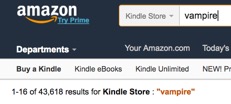3 Surefire Ways to Validate Your Book Idea So It Will Sell
Today’s guest post is by Dave Chesson.
I can remember the first time I self-published a book. I finished writing, spent hundreds of dollars getting it ready, and then hit Publish.
But . . . nothing happened.
Sales were dismal.
It turns out, there was no one on Amazon looking for my book, and my book-marketing skills weren’t good enough at the time to find the market and bring people to it on Amazon.
I had just wasted hours and money putting together a book that no one wanted . . . or worse, knew they wanted.
Has this happened to you?
As a father, husband, and active-duty military guy, I could ill afford to spend my time on something that wouldn’t provide any return.
And that’s when I stopped guessing at what people wanted and decided to start figuring out what they actually wanted when they shopped on Amazon.
As it turns out, there’s an easy and legitimate way to research your book market, validate your book idea, and ensure your next book has a market that Amazon will enjoy. And, this isn’t just for nonfiction either.
Validate Your Book Idea—What Does That Mean?
This simply means do some research of the market to find out what topics are selling and if the competition is something you can compete with. This is what I use to decipher a good book idea from a bad book idea.
If you do this research before you write your next novel, you can write it with less doubt and more confidence that you’re not wasting your time, that there are people eager to read about your topic, and that you can put up a solid fight with the current competition.
Now, it doesn’t mean if you do this process and the numbers don’t work out, that you can’t or shouldn’t write the book. But what it does mean is that you can’t depend on Amazon to sell your book for you. You’re going to need a stellar book marketing plan that is designed to help you find the market outside of Amazon and bring them to your page—and that is a lot of work.
So, I do this validation process with every book idea I have before sitting down to write the book.
Of course, I write about things I’m interested in and knowledgeable about, but I don’t just stop there. I research the market to find out if this is also a book idea that will turn a profit.
Besides, there’s no better way to break through writing procrastination than knowing your next book has a real chance at financial success!
These are the three crucial things I use to validate my book ideas:
- How many people search for your book idea per month
- How much money are similar books earning
- How tough is the competition
Now let’s look at exactly how to complete these three steps.
1. Are People Searching for Your Idea?
The mistake I made was to write a book idea that no one was searching for on Amazon.
Shoppers of all genres, even fiction-book lovers, use keywords to search for books on Amazon, so your keywords are important for getting your book to show up in front of potential customers.
You can learn how popular keywords and phrases are by using tools such as KWFinder.com. You simply type in your book idea, and it will tell you how many people type that phrase into Google per month and how difficult it would be to rank in Google if you targeted those words.
You’re looking for a term that has a high number of searches to indicate your book is something people are looking for.
Although KWFinder is helpful to verify a market for your idea, you are only given three free searches per day without a monthly subscription, and number of searches are an indicator of what people are looking for on Amazon—but it’s not perfect, since people use Google and Amazon differently.
The best way to find out how many people are searching for your book idea on Amazon is through KDP Rocket. Granted, I’m a little biased because I designed program. However, it was specifically made to help authors learn how many times people search for your keywords on Amazon and Google per month, and you have unlimited searches.
Let’s say you love writing about vampires, as an example.
Below is a screenshot from KDP Rocket when I searched for my book idea “vampire.”
![]()
As you can see, it’s a super popular search term on Amazon and Google.
After you verify people are looking for your book idea, the next step is to make sure people who are looking for the topic are also willing to pay for the topic.
2. Is The Idea Profitable?
If you don’t have KDP Rocket, the first step is to go to Amazon.com and search in the Kindle Store for your book idea. You’ll want to examine the results that show up on the first page.
For each book, scroll down to find the Amazon Best Seller Rank (ABSR) and take note of it in a notebook or excel spreadsheet (psst: I have a template you can use here).
Next, use this Amazon Sales Rank Calculator by putting each ABSR in it. It will calculate about how many books are selling per day. Multiply this number by 30 to learn about how many each book sells per month.
Calculate the average number of books sold by all 14 books that appeared on the first page of your Kindle Store search results to find out about how many books per month your book idea sells. With the price you plan to sell your books for in mind, you can determine whether your idea is profitable enough for you.
If you have KDP Rocket, your idea search from step one also revealed the answer to our question about profitability.
![]()
The average monthly earnings for “vampire” is $11,490. Not bad, huh?
It’s tempting to stop here, but don’t! The third and final step is crucial for writing a book you’ll be more likely to sell.
3. How Tough Is The Competition?
“Vampire” is sought after and lucrative, but is it a market you can compete in?
You’ll want to come up with a book idea that you can be #1, or at least in the top 3, because they get the most clicks and sales. So how do you know if you can compete?
You can determine competition difficulty by researching the market on Amazon. When you search for your idea in the Kindle Store, notice how many search results appear.
For “vampire,” you can see 43,618 is a lot of books to compete with.

You’ll also want to find the average ABSR for the top three search results. This will be your target ABSR so you can show up in the top results.
Next, you’ll want to examine the book covers, book descriptions, number and quality of reviews for your competitors. You can score each book in your excel spreadsheet 1-100, with 1 being something you can easily beat and 100 being a book that appears top-notch. Examine the appeal, professionalism, and happiness of the customers.
This information will help you answer the question: Can I compete with this book idea?
If that competition analysis seems like too much work or time to configure, KDP Rocket will give you a competitive score in seconds. It does all this research for you and gives you a score 1-100, with 1 being super easy and 100 being virtually unbeatable.
Did you notice the Competitive Score for “vampire” in the screenshots above?
Vampire is about as competitive as it gets on Amazon.
This score can help you answer the question: Can I compete for this book idea?
If your answer is no, don’t be dismayed. It doesn’t mean you can’t write about that topic. It just means you should refine your topic further so when it comes time to select your kindle keywords, your book will be found and purchased.
With a competitive score of 100, I scrolled through the related keywords. Without the software, you can also type into Amazon “vampire,” “vampire a,” “vampire b,” “vampire c,”etc., and see what appears to get ideas of what people are searching for in the Amazon Kindle Store.
I stopped at “vampire romance” and analyzed that data:
![]()
This one is a little better. The average monthly earnings are so-so, but with competition that is still really difficult to beat, I decided to look further and found “vampire romance for teens.”
![]()
This is a less competitive term, but with a monthly earning of $69, so far people have shown they’re not willing to pay a lot of money for that topic. Keep searching . . .
“Vampire romance for adults”
![]()
Now this idea, still totally related to the vampire idea we wanted to write about, is showing to be popular, profitable, and has easier competition.
And this is how you can easily and legitimately validate a good book idea.
Book Idea Verified
Sitting down and writing a book takes a lot of time money and effort. However, wouldn’t it be great to know that your next book has a better chance of success before you even start?
Well, just by answering the above three simple questions, you now can.
If you’re too pressed for time or hate analyzing numbers and spreadsheets, but see the value in validating your book idea, then KDP Rocket is the solution. I know I won’t write another book without verifying the market, profit, and competition first.
Do you usually research your book idea to validate it before you write? Are there any other steps you take? Or do you write what’s on your mind and hope it sells later?
You can get KDP Rocket HERE!
 Dave Chesson is the book marketing nerd at Kindlepreneur.com. Having been a nuclear engineer and military diplomat, he finds ways to break down complex tactics and make them simple to follow, just as he did with this article on how to perfect your Amazon Author Page.
Dave Chesson is the book marketing nerd at Kindlepreneur.com. Having been a nuclear engineer and military diplomat, he finds ways to break down complex tactics and make them simple to follow, just as he did with this article on how to perfect your Amazon Author Page.











